2017届中考英语第一轮复习教案6
中考英语一轮复习 Unit 6 I'm watching TV导学案(无答案)(2021学年)
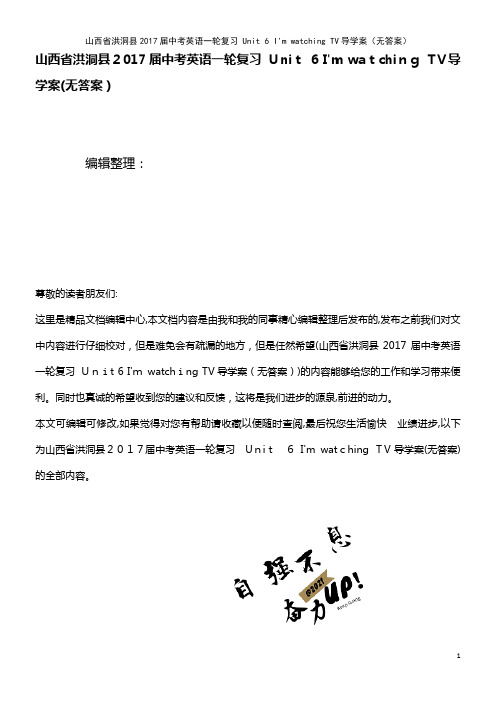
山西省洪洞县2017届中考英语一轮复习Unit6 I'm watchingTV导学案(无答案)编辑整理:尊敬的读者朋友们:这里是精品文档编辑中心,本文档内容是由我和我的同事精心编辑整理后发布的,发布之前我们对文中内容进行仔细校对,但是难免会有疏漏的地方,但是任然希望(山西省洪洞县2017届中考英语一轮复习Unit 6 I'mwatching TV导学案(无答案))的内容能够给您的工作和学习带来便利。
同时也真诚的希望收到您的建议和反馈,这将是我们进步的源泉,前进的动力。
本文可编辑可修改,如果觉得对您有帮助请收藏以便随时查阅,最后祝您生活愉快业绩进步,以下为山西省洪洞县2017届中考英语一轮复习Unit6I'm watching TV导学案(无答案)的全部内容。
Unit 6 I’m watching TV.学习目标:1、复习重点单词,短语和句型。
2、复习现在进行时的构成和用法。
3、复习讨论人们正在做的事情。
Guide One一、词汇拓展1。
use(现在分词)_______ 2. wash(现在分词)_________3.drink(现在分词)_________ 4. shop (现在分词)_________5. man(复数) ______6。
Study(现在分词)___________7。
America(形容词)_________8。
dragon(复数)__________9。
child(复数)__________10. young(反义词)_______11。
miss(现在分词)________12。
wish(同义词)__________Using washing drinking shoppingmen studyingAmericandragons childrenOld missinghopeGuide Two1. watch TV 看电视2。
read a newspaper看报纸3. talkon the phone 通过电话交谈4。
新目标英语中考第一轮复习教案
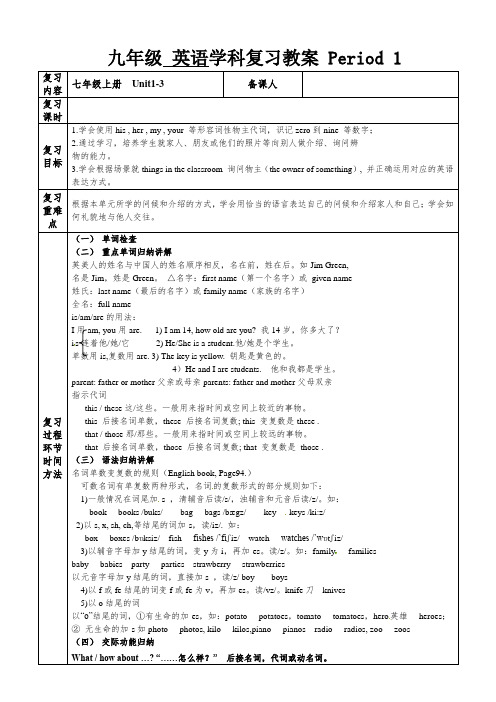
九年级英语学科复习教案 Period 1 复习内容七年级上册Unit1-3 备课人复习课时复习目标1.学会使用his , her , my , your 等形容词性物主代词,识记zero到nine 等数字;2.通过学习,培养学生就家人、朋友或他们的照片等向别人做介绍、询问辨物的能力。
3.学会根据场景就things in the classroom 询问物主(the owner of something), 并正确运用对应的英语表达方式。
复习重难点根据本单元所学的问候和介绍的方式,学会用恰当的语言表达自己的问候和介绍家人和自己;学会如何礼貌地与他人交往。
复习过程环节时间方法(一)单词检查(二)重点单词归纳讲解英美人的姓名与中国人的姓名顺序相反,名在前,姓在后。
如Jim Green,名是Jim,姓是Green。
△名字:first name(第一个名字)或given name姓氏:last name(最后的名字)或family name(家族的名字)全名:full nameis/am/are的用法:I用am, you用are. 1) I am 14, how old are you? 我14岁,你多大了?i s连着他/她/它2) He/She is a student.他/她是个学生。
单数用is,复数用are. 3) The key is yellow. 钥匙是黄色的。
4)He and I are students. 他和我都是学生。
parent: father or mother父亲或母亲parents: father and mother父母双亲指示代词this / these这/这些。
一般用来指时间或空间上较近的事物。
this 后接名词单数,these 后接名词复数; this 变复数是these .that / those那/那些。
一般用来指时间或空间上较远的事物。
that 后接名词单数,those 后接名词复数; that 变复数是those .(三)语法归纳讲解名词单数变复数的规则(English book, Page94.)可数名词有单复数两种形式,名词的复数形式的部分规则如下:1)一般情况在词尾加-s ,清辅音后读/s/,浊辅音和元音后读/z/。
河北中考英语一轮复习学案:人教版七年级上册 Units 1—4(含Starter)

七年级(上) Units 1—4(含Starter )中考基础知识梳理词汇拓展 (针对“词语运用”题型设置)1.family →(复数)families 2.meet →(名词)会议meeting →(过去式/过去分词)met ★ 3.one →(序数词)first ★ →(副词)一次once 4.two →(序数词)second ★ →(副词)两次twice5.three →(序数词)third ★ 6.China →(形容词/名词)Chinese ★7.photo →(复数)photos ★ 8.this →(对应词)that→(复数)these→(复数的对应词)those9.they →(宾格)them ★ →(形容词性物主代词)their →(名词性物主代词)theirs →(反身代词)themselves 10.friend →(形容词)friendly ★ →(形容词的反义词)unfriendly→(名词)友谊friendship ★ 11.I →(宾格)me ★→(形容词性物主代词)my →(名词性物主代词)mine→(反身代词)myself12.help →(形容词)helpful 13.play →(名词)播放机;运动员player 14.thank →(名词)thanks →(形容词)thankful 15.come →(过去式)came ★ →(过去分词)come ★16.think →(过去式/过去分词)thought ★ →(名词)思想;想法thought17.know →(过去式)knew →(过去分词)known ★→(名词)知识knowledge 18.find →(过去式/过去分词)found ★ 19.dictionary →(复数)dictionaries 20.see →(过去式)saw →(过去分词)seen 21.he →(宾格)him →(形容词性物主代词)his →(名词性物主代词)his→(反身代词)himself 22.five →(序数词)fifth ★23.watch →(复数)watches 24.lose →(过去式/过去分词)lost25.eight →(序数词)eighth ★ 短语归纳 (针对“单项选择”“完形填空”题型设置)句型温故(针对“连词成句”“任务型阅读”题型设置)语法总览话题再现河北五年中考真题演练编者按:针对河北近5年基础题型(单项选择、词语运用、连词成句)逐课时分类别进行呈现,即词汇类、语法类和句型类,旨在让学生明确各课时的复习重难点,全面把握中考命题方向,有的放矢,高效备考。
2017年中考英语一轮复习导学案5套
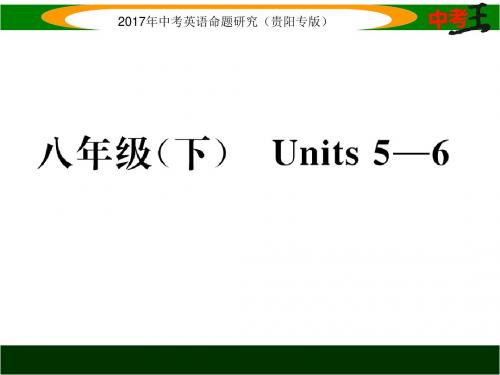
版权所有-
中考重难点突破
高频话题写作指导
2017年中考英语命题研究(贵阳专版)
中考基础知识梳理
中考真题演练
版权所有-
中考重难点突破
高频话题写作指导
2017年中考英语命题研究(贵阳专版)
中考基础知识梳理
中考真题演练
版权所有-
中考基础知识梳理
中考真题演练
版权所有-
中考重难点突破
高频话题写作指导
2017年中考英语命题研究(贵阳专版)
中考基础知识梳理
中考真题演练
版权所有-
中考重难点突破
高频话题写作指导
2017年中考英语命题研究(贵阳专版)
中考基础知识梳理
中考真题演练
中考重难点突破
高频话题写作指导
2017年中考英语命题研究(贵阳专版)
中考基础知识梳理
中考真题演练
版权所有-
中考重难点突破
高频话题写作指导
2017年中考英语命题研究(贵阳专版)
中考基础知识梳理
中考真题演练
版权所有-
中考重难点突破
高频话题写作指导
中考重难点突破
高频话题写作指导
2017年中考英语命题研究(贵阳专版)
中考基础知识梳理
中考真题演练
版权所有-
中考重难点突破
高频话题写作指导
2017年中考英语命题研究(贵阳专版)
中考基础知识梳理
中考真题演练
版权所有-
中考重难点突破
高频话题写作指导
中考基础知识梳理
中考真题演练
版权所有-
中考重难点突破
高频话题写作指导
2017年中考英语命题研究(贵阳专版)
中考英语一轮复习六、七年级“事件经历”主题大单元教学设计
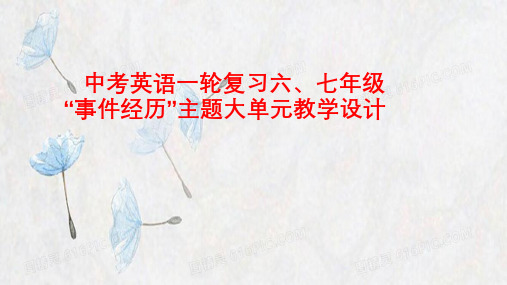
When the workers of China Southern Airlines knew the situation, they quickly reported it to the leaders. After emergency coordination(紧急协调) and the___3___of 101 passengers, China Southern Airlines made a decision “glide(滑) back to the airport and open door again”.
七、教学流程
Part 1. 小试牛刀 Review some key words; phrases and sentences about
“Event and Experience”.
Last weekend
复习归纳总结5W1H的用法
Part 2.夯实基础 活动一、Lily’s daily life
I will never forget that day, not only because I got the job, but I learned a _____(value) lesson---A kind person always gets good luck.
中考英语第一轮复习教案
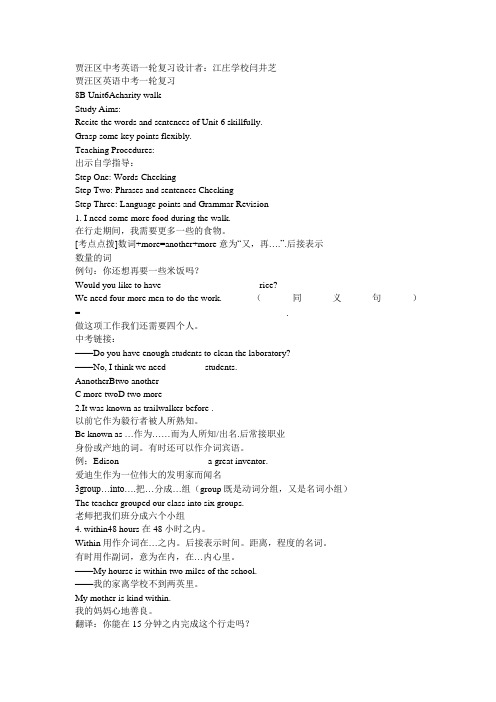
贾汪区中考英语一轮复习设计者:江庄学校闫井芝贾汪区英语中考一轮复习8B Unit6Acharity walkStudy Aims:Recite the words and sentences of Unit 6 skillfully.Grasp some key points flexibly.Teaching Procedures:出示自学指导:Step One: Words-CheckingStep Two: Phrases and sentences CheckingStep Three: Language points and Grammar Revision1. I need some more food during the walk.在行走期间,我需要更多一些的食物。
[考点点拨]数词+more=another+more意为“又,再….”.后接表示数量的词例句:你还想再要一些米饭吗?Would you like to have _____________________rice?We need four more men to do the work.(同义句)=_____________________________________________.做这项工作我们还需要四个人。
中考链接:——Do you have enough students to clean the laboratory?——No, I think we need________ students.AanotherBtwo anotherC more twoD two more2.It was known as trailwalker before .以前它作为毅行者被人所熟知。
Be known as …作为……而为人所知/出名.后常接职业身份或产地的词。
有时还可以作介词宾语。
例;Edison___________________ a great inventor.爱迪生作为一位伟大的发明家而闻名3group…into….把…分成…组(group既是动词分组,又是名词小组)The teacher grouped our class into six groups.老师把我们班分成六个小组4. within48 hours在48小时之内。
仁爱版中考英语第一轮课本复习课件:七年级下册 Units 5—6

七年级下册 Units 5—6
1
目
录2
回归教材 知识梳理 综合训练
1
回归教材 知识梳理
返回首页
知识点1 频度副词的用法
I usually come to school on foot,but sometimes by bike.我通常步行 来学校,但是有时候骑自行车。(Unit 5 P3)
知识点1 知识点2 知识点3 知识点4 知识点5 知识点6 知识点7
how long how far how often how soon
1.— How often do you play basketball with your friends?
—Only once a week. 2.— How soon do you think we can finish the report?
直接跟宾语;across是介词,通常
和go,walk,swim等动词连用。
知识点1 知识点2 知识点3 知识点4 知识点5 知识点6 知识点7
返回首页
单词
含义及用法
介词,“穿过”,强调从空
间内部穿过(其含义常与介 through 词in有关),如穿过forest,
window等。
介词,“翻越;越过”,指
few,a few,little与a little都可以修饰名词,但意义与用法不同,具 体区别如下:
[做题步骤:一辨可不可数,二辨肯定或否]
肯定意义 a few一些;几个 a little一点儿;少量
知识点1 知识点2
否定意义 few几乎没有 little几乎没有
知识点3 知识点4 知识点5
所修饰名词 可数名词复数
人教版英语中考总复习第一轮教案
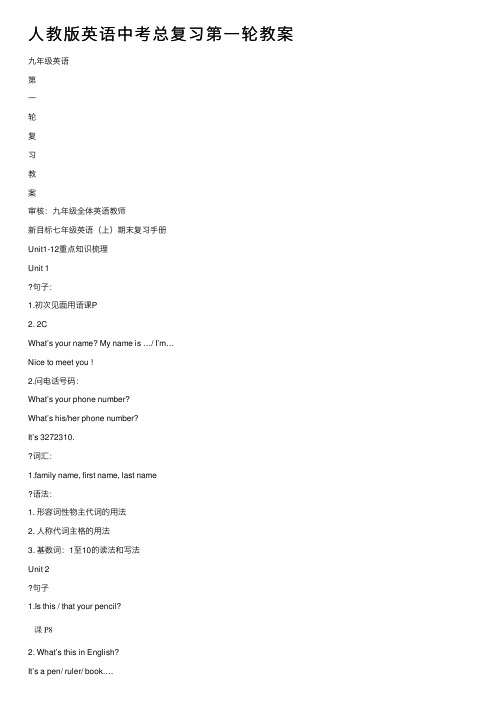
⼈教版英语中考总复习第⼀轮教案九年级英语第⼀轮复习教案审核:九年级全体英语教师新⽬标七年级英语(上)期末复习⼿册Unit1-12重点知识梳理Unit 1句⼦:1.初次见⾯⽤语课P2. 2CWhat’s your name? My name is …/ I’m…Nice to meet you !2.问电话号码:What’s your phone number?What’s his/her phone number?It’s 3272310.词汇:1.family name, first name, last name语法:1. 形容词性物主代词的⽤法2. ⼈称代词主格的⽤法3. 基数词:1⾄10的读法和写法Unit 2句⼦1.Is this / that your pencil?2. What’s this in English?It’s a pen/ ruler/ book….How do you spell pen/ ruler/book? P-E-N.核⼼知识1. 认识26个字母,辅⾳字母,元⾳字母2. 认识⼀般疑问句的句式写作:课P11.3a Found and LostUnit 3句⼦:1.介绍别⼈或某物This is …That is …These are …Those are …词汇:课P131a写作:1.学习英语信的格式2.课P17 以信的形式介绍相⽚中⼈物Unit 4句⼦询问地⽅Where is / are …?It’s …/ They are …核⼼知识1. 词汇课P24 12. take 与bring 的区别3. there be 的⽤法4. on the wall5. 介词:on , in , under , behind ,next to , between…and…6. 认识特殊疑问句的句式熟读:P23.3a , P24. 3 , Grammar Focus Unit 5句⼦1. Do you have …?Yes, I do. No, I don’t.2. Does he / she have …?Yes, he / she does. No, he / she doesn’t.3. Let’s …4. That sounds good / interesting. That’s a good idea.5. Welcome to …核⼼知识⼀、there be 与have 的区别课本:P25 1a , P26 G.F. ,P27 3b,P28 1a , P30 1与3Unit 6句⼦询问所喜欢的东西1. Do you like….?Yes, I do. No, I don’t.2. Does he like …? Yes, he does. No, he does.核⼼知识1.⼀般现在时2. 可数名词与不可数名词3. lots of4. go on picnic5. health, healthy, healthily6. P36 1熟读课本:P31 1a , P32 G. F. , P35 3a, P36 1Unit 7 ?句⼦问价格1. How much is this T-shirt? It’s 10 dollars.2. How much are they? They are 100 dollars.问颜⾊1. What color do you want ? What color is it? 购物⽤语:P393a1. Can I help you? What can I do for you?2. Yes, please.3. I’ll take it .4. Thank you.5. You’re welcome.6. Have a look.核⼼知识两位数的基数词读法与写法P40熟读课本P37 1c,P38 G. F.,P 39 3a ,P40 1b,P41 3a ,P42 1与3Unit 8句⼦1. When is your birthday?2. My birthday is January fifteenth.3. What year were you born?4. I was born in 1999.5. When were you born?6. I was born in January first,1999.核⼼知识1.基数词和序数词基变序⼝决基变序有规律,词尾加上-th ;⼀⼆三特殊记,单词结尾t d d ;⼋减t , 九减e , f 要把ve替;ty 把y 改为i , 记住前还有e ;若遇到⼏⼗⼏,只把个位变序。
2017届九年级中考英语总复习教案六
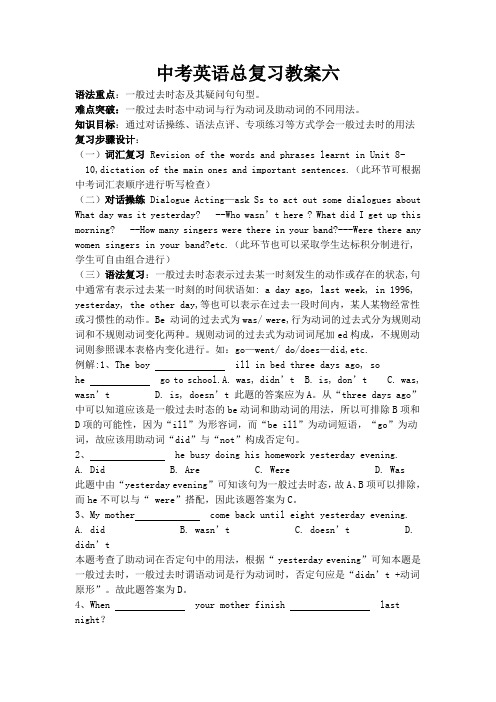
中考英语总复习教案六语法重点:一般过去时态及其疑问句句型。
难点突破:一般过去时态中动词与行为动词及助动词的不同用法。
知识目标:通过对话操练、语法点评、专项练习等方式学会一般过去时的用法复习步骤设计:(一)词汇复习Revision of the words and phrases learnt in Unit 8- 10,dictation of the main ones and important sentences.(此环节可根据中考词汇表顺序进行听写检查)(二)对话操练Dialogue Acting—ask Ss to act out some dialogues about What day was it yesterday? --Who wasn’t here ? What did I get up this morning? --How many singers were there in your band?---Were there any women singers in your band?etc.(此环节也可以采取学生达标积分制进行,学生可自由组合进行)(三)语法复习:一般过去时态表示过去某一时刻发生的动作或存在的状态,句中通常有表示过去某一时刻的时间状语如: a day ago, last week, in 1996, yesterday, the other day,等也可以表示在过去一段时间内,某人某物经常性或习惯性的动作。
Be 动词的过去式为was/ were,行为动词的过去式分为规则动词和不规则动词变化两种。
规则动词的过去式为动词词尾加ed构成,不规则动词则参照课本表格内变化进行。
如:go—went/ do/does—did,etc.例解:1、The boy ill in bed three days ago, sohe go to school.A. was, didn’t B. is, don’t C. was, wasn’t D. is, doesn’t 此题的答案应为A。
中考英语一轮复习教案 七年级下册Unit 1-3
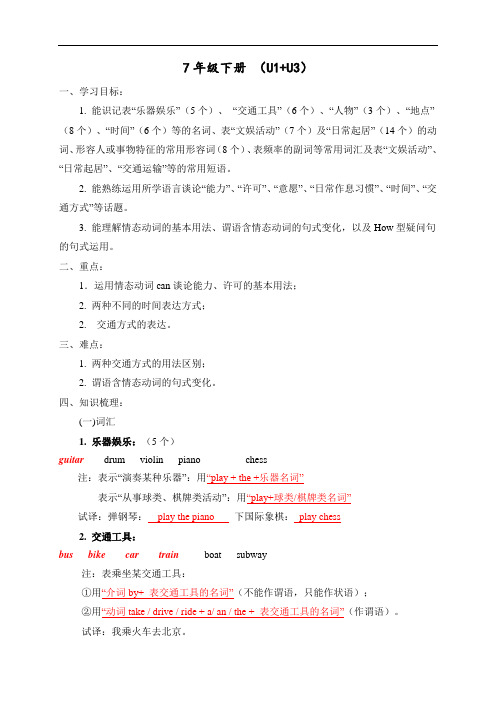
7年级下册(U1+U3)一、学习目标:1. 能识记表“乐器娱乐”(5个)、“交通工具”(6个)、“人物”(3个)、“地点”(8个)、“时间”(6个)等的名词、表“文娱活动”(7个)及“日常起居”(14个)的动词、形容人或事物特征的常用形容词(8个)、表频率的副词等常用词汇及表“文娱活动”、“日常起居”、“交通运输”等的常用短语。
2. 能熟练运用所学语言谈论“能力”、“许可”、“意愿”、“日常作息习惯”、“时间”、“交通方式”等话题。
3. 能理解情态动词的基本用法、谓语含情态动词的句式变化,以及How型疑问句的句式运用。
二、重点:1.运用情态动词can谈论能力、许可的基本用法;2. 两种不同的时间表达方式;2. 交通方式的表达。
三、难点:1. 两种交通方式的用法区别;2. 谓语含情态动词的句式变化。
四、知识梳理:(一)词汇1. 乐器娱乐:(5个)guitar drum violin piano chess注:表示“演奏某种乐器”:用“play + the +乐器名词”表示“从事球类、棋牌类活动”:用“play+球类/棋牌类名词”试译:弹钢琴:play the piano 下国际象棋:play chess2. 交通工具:bus bike car train boat subway注:表乘坐某交通工具:①用“介词by+ 表交通工具的名词”(不能作谓语,只能作状语);②用“动词take / drive / ride + a/ an / the + 表交通工具的名词”(作谓语)。
试译:我乘火车去北京。
I go to Beijing by train. / I take the train to Beijing.3. 动词:文娱活动sing dance draw swim run ride exercise唱歌跳舞画画游泳跑步骑乘锻炼日常起居speak talk tell write show clean teach 说谈话告诉写展示打扫教work live dream leave drive join make 工作住梦想离开驾驶加入使成为taste cross brush品尝横过刷词汇串记:①因为我喜欢唱歌、跳舞、游泳、跑步和锻炼,所以我很健康。
冠词教案-中考英语一轮复习

课 程 目 标
班型:进击班 课程: 语言知识要求
基础语法 1.冠词的定义 2.冠词的分类 3.冠词的用法 4.冠词的位置
基础词汇 1.a/an/the/零冠词
授课类型:语法 语言技能要求 1.掌握各种情形下冠词的取舍 2.发音区别
重难点 1.冠词的选择及合理 使用 2.发音区别
课时:第一课时 备注与补充
词汇
教学准备 1.对应习题及练习册
授课过程 Review
授课内容 1.相互问候
授课形式 1.教师和学生互相问候
听 Listening() 说 Speaking()
读 Reading(√)
写 Writing(√)
词汇 Vocabulary() 语法 Grammar(√)
授课流程
(10mins)
10)用在表示某一品质或情绪的具体时间、人物或东西 的抽象名词前; e.g.: She is a disappointment to us. 她令我们很失望。 11)一些表示重量、长度、时间等的词组中,普遍使用 不定冠词; e.g.: a hundred 一百;a pair of shoes 一双鞋子; twice a week 一周两次; a handful of 一把; one at a time 一次,一个; at a glance 看一眼; at a blow 一下子; at a stretch 一口气地 12)形容词最高级前加 a 不含有比较的概念,只用来加 强语气,是“极;很;非常”的意思,相当于 very; e.g.: That was a most exciting game. 那是场极其令人 兴奋的比赛。 13)用在地名前,表示“一个…样的地方”; e.g.: She is now a different China from what she was ten years ago. 中国现在同十年前相比不一样了。 (2)定冠词的用法: 1)用于特质某些人或某些事物; The books in the desk are mine. 桌子里的书是我的。 2)用于上文提到过的人或物; e.g.: I saw a film yesterday. The film was ended at 8 o’clock.我昨天看了一场电影。电影是 8 点钟结束的。
中考英语专项复习——六种基本时态的教案
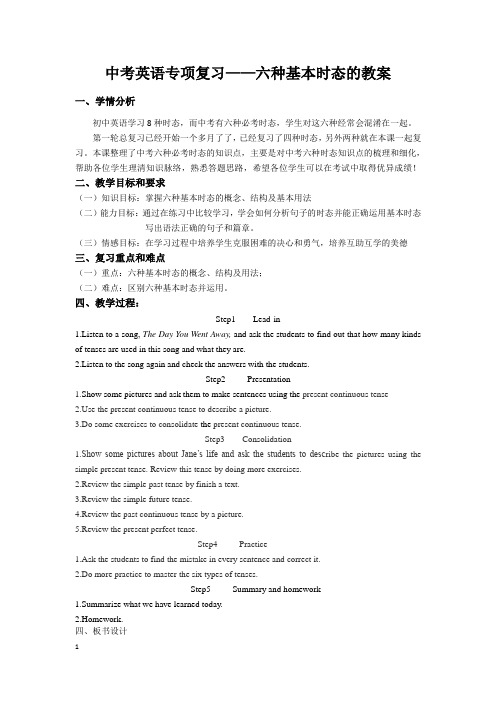
中考英语专项复习——六种基本时态的教案一、学情分析初中英语学习8种时态,而中考有六种必考时态,学生对这六种经常会混淆在一起。
第一轮总复习已经开始一个多月了了,已经复习了四种时态,另外两种就在本课一起复习。
本课整理了中考六种必考时态的知识点,主要是对中考六种时态知识点的梳理和细化,帮助各位学生理清知识脉络,熟悉答题思路,希望各位学生可以在考试中取得优异成绩!二、教学目标和要求(一)知识目标:掌握六种基本时态的概念、结构及基本用法(二)能力目标:通过在练习中比较学习,学会如何分析句子的时态并能正确运用基本时态写出语法正确的句子和篇章。
(三)情感目标:在学习过程中培养学生克服困难的决心和勇气,培养互助互学的美德三、复习重点和难点(一)重点:六种基本时态的概念、结构及用法;(二)难点:区别六种基本时态并运用。
四、教学过程:Step1 Lead-in1.Listen to a song, The Day You Went Away, and ask the students to find out that how many kinds of tenses are used in this song and what they are.2.Listen to the song again and check the answers with the students.Step2 Presentation1.Show some pictures and ask them to make sentences using the present continuous tensee the present continuous tense to describe a picture.3.Do some exercises to consolidate the present continuous tense.Step3 Consolidation1.Show some pictures about Jane’s life and ask the students to desc ribe the pictures using the simple present tense. Review this tense by doing more exercises.2.Review the simple past tense by finish a text.3.Review the simple future tense.4.Review the past continuous tense by a picture.5.Review the present perfect tense.Step4 Practice1.Ask the students to find the mistake in every sentence and correct it.2.Do more practice to master the six types of tenses.Step5 Summary and homework1.Summarize what we have learned today.2.Homework.四、板书设计中考英语专项复习——六种基本时态Class_________ Name______________ No._________一、学习目标和要求(一)掌握六种基本时态的概念、结构及基本用法(二)通过在练习中比较学习,学会如何分析句子的时态并能正确运用基本时态写出语法正确的句子和篇章。
中考英语第一轮复习教案七篇
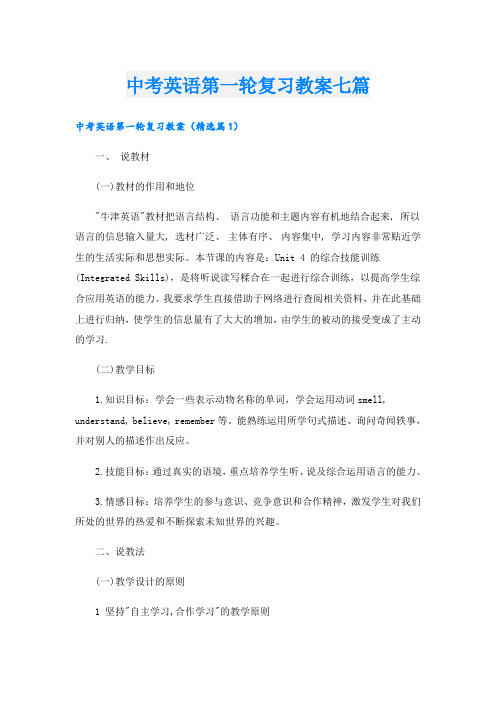
中考英语第一轮复习教案七篇中考英语第一轮复习教案(精选篇1)一、说教材(一)教材的作用和地位"牛津英语"教材把语言结构、语言功能和主题内容有机地结合起来, 所以语言的信息输入量大, 选材广泛、主体有序、内容集中, 学习内容非常贴近学生的生活实际和思想实际。
本节课的内容是:Unit 4 的综合技能训练(Integrated Skills),是将听说读写糅合在一起进行综合训练,以提高学生综合应用英语的能力。
我要求学生直接借助于网络进行查阅相关资料,并在此基础上进行归纳,使学生的信息量有了大大的增加,由学生的被动的接受变成了主动的学习.(二)教学目标1.知识目标:学会一些表示动物名称的单词,学会运用动词smell, understand, believe, remember等。
能熟练运用所学句式描述、询问奇闻轶事,并对别人的描述作出反应。
2.技能目标:通过真实的语境,重点培养学生听、说及综合运用语言的能力。
3.情感目标:培养学生的参与意识、竞争意识和合作精神,激发学生对我们所处的世界的热爱和不断探索未知世界的兴趣。
二、说教法(一)教学设计的原则1 坚持"自主学习,合作学习"的教学原则教师打破了以教师为中心, 单项灌输的陈旧模式, 在课堂教学中尽可能发挥学生的主动性和合作精神, 营造了良好的学习氛围, 更重要的是在频繁的交流中, 学生的语言表达能力提高了。
2 遵循英语教学的交际性原则交际性原则是英语教学中的一个指导性原则, 教学最终的目的不仅要使学生掌握知识, 更重要的是使学生在理解的基础上, 在交际性练习中培养交际能力,而培养这种交际能力, 就是反映在课堂教学中学生以主人翁态度, 积极、主动、大胆地参与英语课堂练习活动的主体意识上。
3 追求和谐的课堂活动学生主体性的发挥, 要在民主, 平等的氛围中体现, 更要在科学, 和谐的教学活动中进行. 课堂教学不仅要处理好老师、学生、教材等关系, 还要尽可能地发挥三者各自的特长, 这就是教学的化。
人教版英语中考第一轮复习基础过关 八年级上册 Units 4~6(含答案)
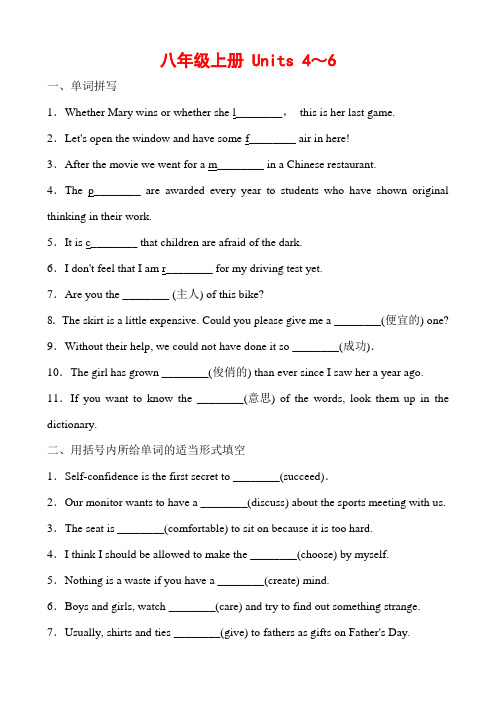
八年级上册 Units 4~6一、单词拼写1.Whether Mary wins or whether she l________,this is her last game.2.Let's open the window and have some f________ air in here!3.After the movie we went for a m________ in a Chinese restaurant.4.The p________ are awarded every year to students who have shown original thinking in their work.5.It is c________ that children are afraid of the dark.6.I don't feel that I am r________ for my driving test yet.7.Are you the ________ (主人) of this bike?8.The skirt is a little expensive. Could you please give me a ________(便宜的) one? 9.Without their help, we could not have done it so ________(成功).10.The girl has grown ________(俊俏的) than ever since I saw her a year ago. 11.If you want to know the ________(意思) of the words, look them up in the dictionary.二、用括号内所给单词的适当形式填空1.Self-confidence is the first secret to ________(succeed).2.Our monitor wants to have a ________(discuss) about the sports meeting with us. 3.The seat is ________(comfortable) to sit on because it is too hard.4.I think I should be allowed to make the ________(choose) by myself. 5.Nothing is a waste if you have a ________(create) mind.6.Boys and girls, watch ________(care) and try to find out something strange. 7.Usually, shirts and ties ________(give) to fathers as gifts on Father's Day.8.The woman is a famous ________(act) who ________(act) as a countrywoman in a TV play series last year.9.Tom was ________(choose) not only because he was clever but he was hard-working.三、完成句子1.—What's ________ ________ movie theater?最好的影院是哪家?—Town Cinema. It's ________ ________ ________ home.小镇影院。
动词教案-中考英语一轮复习

can’t help doing忍不住做某事
as…as one can =as… as possible尽可能…
2could的用法:
a.表示过去的“能力”
e.g.: When I was young, I could climb any tree in the forest. 小时候森林里的任何树我都能爬上去。
Someone is knocking at the door. Who it could be? 有人在敲门,会是谁呢?(表示现在的可能性)
c.表示委婉的语气,用来委婉地提出请求、想法、建议。
e.g.: Could you please speak a little louder? 你能否大一点声说?
1.教师和学生互相问候
2.核对作业答案,让正确的学生讲解错题
3.考察上节课内容
Presentation(40mins)
1.动词的定义分类
2.谓语动词
3.助动词
4.时态
5.情态助动词
1.PPT呈现动词的定义分类
2.教师讲解谓语动词的分类、基本形式和运用
3.教师讲解助动词的分类和运用
4.教师联系谓语动词和语法助动词讲解时态
study
studies
③现在分词:
规则
动词原形
现在分词
一般情况下直接加-ing
help
helping
以不发音字母e结尾的动词,去掉e再加-ing
take
taking
以重读闭音节结尾,末尾只有一个辅音字母的动词,要双写这个辅音字母再加-ing
begin
beginning
少数以ie结尾的动词,先变ie为y,再加-ing
初中英语中考复习 中考英语(人教新课标)一轮复习教案:七年级上册(SU1-3+U1-3)

第1课时课题:7年级上册(SU1-3+U1-3)一、目标:1. 能识记16个人称代词(主格人称代词、宾格人称代词);16个物主代词(形容词性物主代词、名词性物主代词);表颜色的单词;表家庭成员的词;表与学习学校相关的物品的词;表衣物与生活用品的词;以及表示数量多少的基数词(从zero -million)。
2. 能熟练运用所学语言进行问候、介绍、辨认事物及谈论物的所属关系。
3.能理解名词、代词及what问句/who问句的使用与谓语为动词be的一般疑问句句式及其回答。
二、重点:1.谓语为动词be的句式及其变化;2. 可数名词的运用;3. 数词的复习。
三、难点:1. 主格人称代词与宾格人称代词的用法区别;2. 可数名词与不可数名词用法区别;3.形容词性物主代词与名词性物主代词的用法区别。
四、知识梳理:(一)词汇:1. 人称代词与物主代词:人称数人称代词物主代词备注主格宾格形容词性名词性第一人称单数I me my mine 主格的人称代词做主语;宾格的人称代词做宾语。
复数we us our ours第二人称单数you you your you rs复数you you your yours 形容词性物主代词和名词性物主代词用法口诀:有第三单数he him his hisshe her her hers中考一轮复习教学参考资料人称it it its its 名就用形,无名就用名。
有名词的话,前面就用形容词性物主代词修饰,没有名词就用名词性物主代词。
复数they them their theirs2. 表颜色的单词:color 红色橙色黄色绿色黑色白色蓝色紫色red orange yellow green black white blue purple3. 家族成员:grandparents祖父母/外祖父母familygrandfather /grandpa grandmother /grandmaparents父母亲father / dad mother /mom uncle aunt son儿子daughter女儿son and daughter儿女brother兄弟sister 姐、妹cousin4. 学习学校相关物品:school thingsschoolbagbagbook 书notebook 笔记本dictionary 字典pencil box pen钢笔pencil ruler erasermap生活物品watch key ring card手表钥匙戒指卡片clothesjacket coat shirt blouse sweater 夹克衫外套衬衫女衬衫毛衣trousers pants jeans dress skirt 长裤短裤牛仔裤女裙短裙其他配饰sock shoe scarf glasses glove 袜子鞋子围巾眼镜手套6. 数词:基数词表数目多少。
【牛津译林版】中考英语一轮复习教案:7下 Unit 6 Outdoor fun
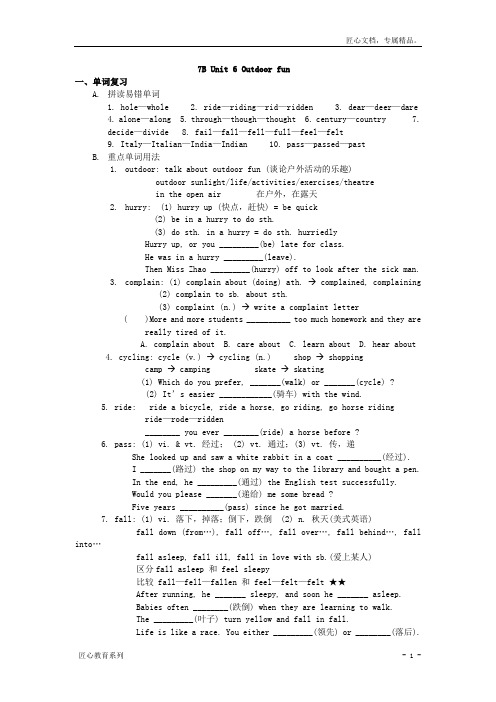
7B Unit 6 Outdoor fun一、单词复习A.拼读易错单词1. hole—whole2. ride—riding—rid—ridden3. dear—deer—dare4. alone—along5. through—though—thought6. century—country7.decide—divide 8. fail—fall—fell—full—feel—felt9. Italy—Italian—India—Indian 10. pass—passed—pastB.重点单词用法1.outdoor: talk about outdoor fun (谈论户外活动的乐趣)outdoor sunlight/life/activities/exercises/theatrein the open air 在户外,在露天2.hurry: (1) hurry up (快点,赶快) = be quick(2) be in a hurry to do sth.(3) do sth. in a hurry = do sth. hurriedlyHurry up, or you _________(be) late for class.He was in a hurry _________(leave).Then Miss Zhao _________(hurry) off to look after the sick man.plain: (1) complain about (doing) ath. → complained, complaining(2) complain to sb. about sth.(3) complaint (n.) → write a complaint letter( )More and more students __________ too much homework and they are really tired of it.A. complain aboutB. care aboutC. learn aboutD. hear about4. cycling: cycle (v.) → cycling (n.) shop → shoppingcamp → camping skate → skating(1) Which do you prefer, _______(walk) or _______(cycle) ?(2) It’s e asier ____________(骑车) with the wind.5. ride: ride a bicycle, ride a horse, go riding, go horse ridingride—rode—ridden________ you ever ________(ride) a horse before ?6. pass: (1) vi. & vt. 经过; (2) vt. 通过;(3) vt. 传,递She looked up and saw a white rabbit in a coat __________(经过).I _______(路过) the shop on my way to the library and bought a pen.In the end, he _________(通过) the English test successfully.Would you please _______(递给) me some bread ?Five years __________(pass) since he got married.7. fall: (1) vi. 落下,掉落;倒下,跌倒 (2) n. 秋天(美式英语)fall down (from…), fall off…, fall over…, fall behind…, fall into…fall asleep, fall ill, fall in love with sb.(爱上某人)区分fall asleep 和 feel sleepy比较 fall—fell—fallen 和 feel—felt—felt ★★After running, he _______ sleepy, and soon he _______ asleep.Babies often ________(跌倒) when they are learning to walk.The _________(叶子) turn yellow and fall in fall.Life is like a race. You either _________(领先) or ________(落后).8. fail: vi. & vt. 失败, fail—failing—failed—failed →failure (n. 失败) fail to do sth. = fail in (doing) sth. 失败做某事,某事没有做成功 succeed in doing sth. 成功做某事fail (in) the exam (考试不及格)→pass the exam (考试合格)He wanted to run away, but he wasn’t able to. (用一个单词同义替换) Susan is a clever and hard-working girl, so she never _______(不及格) in any exam.Success comes after many __________(fail).9. decide: vt. & vi. 决定, deciding—decided → decision (n. 决定)★★decide (not) to do sth. 决定(不)做某事make a decision to do sth. 作出决定做某事make up one’s mind(s) to do sth. 下决心(决定)做某事decide that 从句→decide to do …decide wh-从句→ decide 疑问词to do …He decided that he would buy a new car.=He decided ____________.I can’t decide which one I should take.= I can’t decide ___________.10. enter: vt. 进入, 加入,entering—entered → entrance (n. 进入,入口)enter the room = go/come/get into the roomenter into … 包含于…之中,融入,成为…的一部分(1) The old lady noticed the burglar_____________(进入) the housethrough the kitchen window.(2) Where is the ______________(enter) to the park, please ?(3) In 1978, Tan Dun ___________(考入) the Central Conservatory ofMusic in Beijing.(4) His ______________(ill) didn’t enter into my plans.11. forget: vi. & vt. 忘记, forget—forgetting—forgot—forgotten★★forgetful adj. 健忘的, more forgetful—the most forgetfulforget / remember to do sth. 忘记/记住要做某事forget / remember doing sth. 忘记/记得做过某事forget sth. (with sb.) 忘记随身带某物leave sth. in/at/on 地点状语把某物忘放在某处(留在某处)(1)Could you please not forget _________(lock) the door when you leave?(2)He was so _________(forget) that he didn’t turn off the lights lastnight.(3)I still remember _________(meet) her in the park ten years ago.(4)I’m sorry that I ___________ your umbrella in my office yesterday.A. have putB. have laidC. leftD. forgot二、重点词组、句型用法1.I want to go riding. = I’d like to go riding.go swimming/ skating/ boating/ shopping/ camping/ fishing2.A: What do you like about camping ? (你喜欢野营的什么方面?)B: I like being outside, near beautiful lakes and hills.(我喜欢在户外近距离接触美丽的湖泊和丘陵)eg. (1) A: __________________________________ the film ?B: It’s interesting./ I like it very much.(2) A: __________________________________ the film ?B: Its theme songs.3. look up (at …) 抬头看着… look down (at…) 低头看…, 向下看look up the word in the dictionary (look it up) 查字典look down on/ upon … 瞧不起,藐视…look out of … 朝…外看look out 当心,小心 look (sb.) over 体检look for … 寻找…look after … 照顾,照料… look into … 朝…里面看look like … 看起来像… look alike 看起来相像look the same as …看起来和…相同look at … 看着…4.It took a watch out of its pocket and looked at the time.take … out of …, get out of …, run out of …, push … out of …,jump out of …, put out, sell out5.Alice did not want to let the rabbit get away, so she jumped down the holetoo.get away (from…), get into…, get out of …, get on …, get off …,get up, get married to …, get used to doing …, get on/along well with …6. She found herself alone in a long, low hall. ★★(1) find sb. / sth. + adj. →find sb./sth. to be …(2) find sb./sth. + 介词短语(3) find sb. doing … (表主动)(4) find sb./sth. done (表被动)(5) find it adj. to do sth.eg. We find it important ____________(learn) English well.I found him ________(cover) the table with a few papers when I got there.You can find the ground _________(cover) with thick snow.我们发现他是一个诚实的孩子。
人教版新目标英语中考一轮复习 九年级 Unit6 复习导学案设计
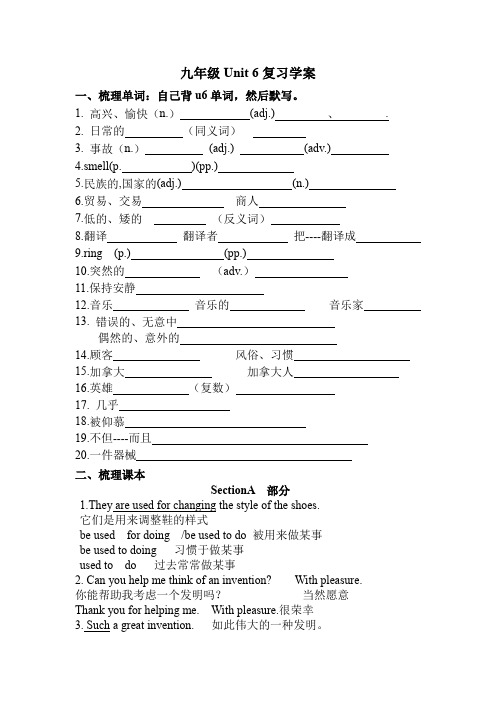
九年级Unit 6复习学案一、梳理单词:自己背u6单词,然后默写。
1. 高兴、愉快(n.)(adj.) 、.2. 日常的(同义词)3. 事故(n.)(adj.) (adv.)4.smell(p. )(pp.)5.民族的,国家的(adj.) (n.)6.贸易、交易商人7.低的、矮的(反义词)8.翻译翻译者把----翻译成9.ring (p.) (pp.)10.突然的(adv.)11.保持安静12.音乐音乐的音乐家13. 错误的、无意中偶然的、意外的14.顾客风俗、习惯15.加拿大加拿大人16.英雄(复数)17. 几乎18.被仰慕19.不但----而且20.一件器械二、梳理课本SectionA 部分1.They are used for changing the style of the shoes.它们是用来调整鞋的样式be used for doing /be used to do 被用来做某事be used to doing 习惯于做某事used to do 过去常常做某事2. Can you help me think of an invention? With pleasure.你能帮助我考虑一个发明吗?当然愿意Thank you for helping me. With pleasure.很荣幸3. Such a great invention. 如此伟大的一种发明。
Such +a/an/+adj. +n. Such+adj.+n.复数/不可数名词So+adj.+a/an+n. So +adv.试一试:Mrs White has__ _ that she is unable to get a job.A.so little educationB. such little educationC.so little an educationD. such a little education4.It is said that a Chinese ruler called Shen Nong was the first to discover tea as a drink.①It is said/believed/reported that------据说/ 人们相信/据报道--------这是一个主语从句,it是形式主语,真正的主语是that后面从句②the first to do第一个做某事5.Some leaves remained there for some time一些叶子落入在那儿停留一段时间。
- 1、下载文档前请自行甄别文档内容的完整性,平台不提供额外的编辑、内容补充、找答案等附加服务。
- 2、"仅部分预览"的文档,不可在线预览部分如存在完整性等问题,可反馈申请退款(可完整预览的文档不适用该条件!)。
- 3、如文档侵犯您的权益,请联系客服反馈,我们会尽快为您处理(人工客服工作时间:9:00-18:30)。
单项选择题考查的是对基础知识的掌握和运用,一般会考到冠词、代词、形容词或副词比较级的基本用法、主从复合句、最基本的几种时态以及被动语态。
定语从句一般考查that 或who作引导词;一些比较典型的状语从句,如:so... that句型,if 引导的条件状语从句,when或while引导的时间状语从句等。
再就是会考到一些重要的动词、不定代词、副词、特殊的介词等的辨析。
常考的而且考生又容易出错的动词有:cost,spend,pay,take;speak,talk,say,tell;take,bring;dress,wear,put on,have;不定代词other,others,the other,the others,another,all,none,both,each 等;副词sometime,sometimes,some time,one day,the other day,some day 等;限定词few,a few,little,a little 等。
一些连词词组如not only... but also;neither... nor;either... or;both... and... 。
一些短语动词、固定搭配、习惯用法都是考试的重点。
近几年的单项选择题呈现以下命题特点:1. 考查知识点全,覆盖面广单项选择考查的知识点比较全面,几乎覆盖初中阶段的所有语法点与几大主要词类,而且考查重点突出,没有考偏题、怪题。
2. 动词是考查的核心纵观近四年的中考题,动词在考点中处于重要地位。
与动词有关的时态、语态、助动词、情态动词、非谓语动词子项目特别多,动词的时态、语态及固定搭配绝对是中考英语复习的重点。
动词的考查在单项选择中占到20%—30%的比例,因此要加强相关词汇、短语的记忆。
但要避免单纯地死记硬背,应善于寻找词汇、短语之间的联系,注意结合语境,在理解的基础上熟记典型例句和常用搭配,总结规律,并根据自己的记忆特点,选择科学的记忆方法。
记忆单词应和阅读结合起来,把单词融入句子和语境中,利用上下文来帮助记忆。
3. 考查的语境化、时代化与生活化近几年的中考英语题目越来越遵循着这样一个原则,不再单独地考查某一个语法或词汇点,而是把考点放到一个生活化的语言环境中,突出运用能力。
例1(2016·山东临沂)Sweet wormwood(青蒿) is a common plant in China. Tu Youyou is the woman used the plant’s special power to save millions of lives.A. whichB. whoC. whoseD. /【解析】本题考查定语从句。
先行词是the woman,所以定语从句的引导词应该用who,又因who在定语从句中作主语,故不能省略,因此选B。
【答案】B例2(2016·济南)—The black T-shirt is very good on you. And it’s only 30 yuan.—Great. .A. It looks badB. It’s too expensiveC. I don’t like itD. I’ll take it【解析】It looks bad“它看上去不好”;It’s too expensive“它太贵了”;I don’t like it“我不喜欢它”;I’ll take it“我买了”。
由空格前的Great. 可知,D项符合语境。
【答案】D近几年单项选择测试由原来的语法型测试逐渐转向以测试考生的交际能力、语言应变能力、词汇运用能力等为主的能力型测试。
呈现以下命题趋势:1. 加强对情景交际的考查,注重日常交际用语的表达。
2. 一般常从词汇、语法、固定词组、特定句式等方面进行考查。
3. 加强与相关学科的联系,具有鲜明的时代特色,加强综合能力和创新能力的考查。
4. 加强对学生解题技巧的训练,有助于提高单项选择的正确率。
单项选择题是中考英语的必考题目,也是得分率应该比较高的题目,如何在考试中拿到高分,需要我们进行有效的复习。
1. 明确词性,以全面地复习语法、词汇知识为主,然后结合大量的真题练习,夯实基础,逐步提高。
2. 将单项选择题进行单独的分类整理。
所谓的分类整理是将各个考点的试题单独抽出。
整理的标准是:先从自己最薄弱的环节开始整理。
比如冠词考点,如果逢做必错,那么就可以首先对其进行整理。
3. 认真研究自己整理的真题,研究并掌握各种考查方式,平时多积累,扎实地掌握基础知识,有目的地对单项选择题进行专项训练。
每一道选择题都会考到一个知识点,每一道题都会有一个关键词。
要学会分析、揣摩出题人的意图,找出每道题中的关键词来帮助自己进行选择。
要做好单项选择题,首先应熟练掌握句型、固定搭配、习惯用法等方面的知识。
除此之外,还应该了解一些解题技巧,提高自己解题的综合能力。
在做单项选择题时,要正确把握词性,掌握时态、语态、词义、语序、各种不同的从句及交际用语。
另外,掌握一些解题方法是很有必要的。
下面推荐几种解题方法:1. 直接法直接利用相关语法知识,通过题干中的已知信息,捕捉到解题线索,从而得出正确答案。
例(2016·山东潍坊)Peter doesn’t feel sure of in his new school.A. heB. himC. hisD. himself【解析】根据句意“彼得在新学校里对他自己不自信”可知,此处应用反身代词。
feel sure of oneself“对自己自信”,故选D。
【答案】D2. 关键词法许多题目中都有这样一些词,它们对于快速而准确地判定答案起着至关重要的作用,我们称这些词为关键词。
找到句中的关键词,也就找到了解题的突破口。
例(2016·山东潍坊)Jack was a little disappointed, he still went on with his work.A.Although B. Because C. Since D. If【解析】本题关键词是still“仍然”。
句意:尽管杰克有点儿失望,但是他仍然继续工作。
although“尽管”,引导让步状语从句,与still遥相呼应。
because“因为”;since“既然”;if“如果”,均不符合题意。
故选A。
【答案】A3. 类推法如果对题目的备选项都没有把握或把握很小,不妨利用“如果A 对,那么B也对”的类推法,从而可将A、B予以否定。
例—Who’s the man at the door?—A. He is a doctor.B. He is a friend of mine.C. He is a famous singer.D. He is twenty.【解析】仔细分析备选项就可发现:A、C两项针对的是“职业”。
若A是对的,那么C也是对的。
D回答的是年龄。
故只有B才是正确的。
【答案】B4. 前后照应法此方法多用于含两个以上句子或以对话形式命题的题目。
解题前透彻理解,然后联系上下文,捕捉隐含信息,方能准确找出答案。
例—He isn’t a teacher,is he?—He works in a hospital.A. Yes,he is.B. No,he isn’t.C. Yes,he isn’t.D. No,he is.【解析】本题考查反意疑问句的回答。
由答语后句可知,他的身份不是教师。
“前否后肯”型反意疑问句回答中的Yes译为“不”,No译为“是”。
因此应选择B。
【答案】B5. 排除法根据题干提供的信息,先把一眼就看出的干扰项排除,缩小选择范围,然后将剩余的选项代入空白处进行检验,辨别真伪。
例(2016·山东潍坊)It’s difficult to imagine it is like in that village after the earthquake.A.when B. what C. where D. which【解析】从后面的is like 可以看出,like是介词,意为“像”,后应跟疑问代词引导的宾语从句,先排除A、C两项。
which表示“哪一个”, 故也排除。
What... is like?“……怎么样?”,因此选B。
【答案】B6. 交际法正确运用交际用语,联系上下文直接解题。
例(2016·山东潍坊)—I’ve got the job as a director at Radio Beijing.—!That’s good news!A.Go ahead B. Come on C. Cheers D. Congratulations【解析】本题考查交际用语。
从上文“我在北京电台找到一份导演的工作”和下文“好消息”来看,应该对找到工作表示祝贺。
congratulations“祝贺”,符合题意。
go ahead“继续”;come on“加油”;cheers“干杯”,均不符合语境。
故选D。
【答案】D(一)1. There is pen on the desk and pen is new.A. a;anB. an;theC. a;theD. an;a。
表示“一”这一概念时,应用不定冠词a/an,pen的读音以辅音音素开头,故第一空使用不定冠词a;再次讲述前面提到的人或物时,其前应使用定冠词the表示特指,故答案应为C。
2. Don’t worry about me. I can take good care of .A. meB. myselfC. himD. himself此处用反身代词myself,故选B。
3. When Peter comes, please ask him to leave a .A. noticeB. messageC. sentenceD. information“通知”;message“消息”;sentence“句子”;information“信息”。
leave a message意为“留口信儿,留便条”,是固定短语。
句意:当彼得来的时候,请让他留张便条。
4. Look!Our hometown is now than it used to be.A. quite beautifulB. the most beautifulC. very beautifulD. much more beautiful前漂亮多了”可知应该用比较级,beautiful是多音节词,其比较级是more beautiful,much可以修饰比较级,故选D。
5. Look at the smog(雾霾). bad weather it is!A. HowB. How aC. WhatD. What a因为中心词是不可数名词weather,所以不能用不定冠词,故选C。
